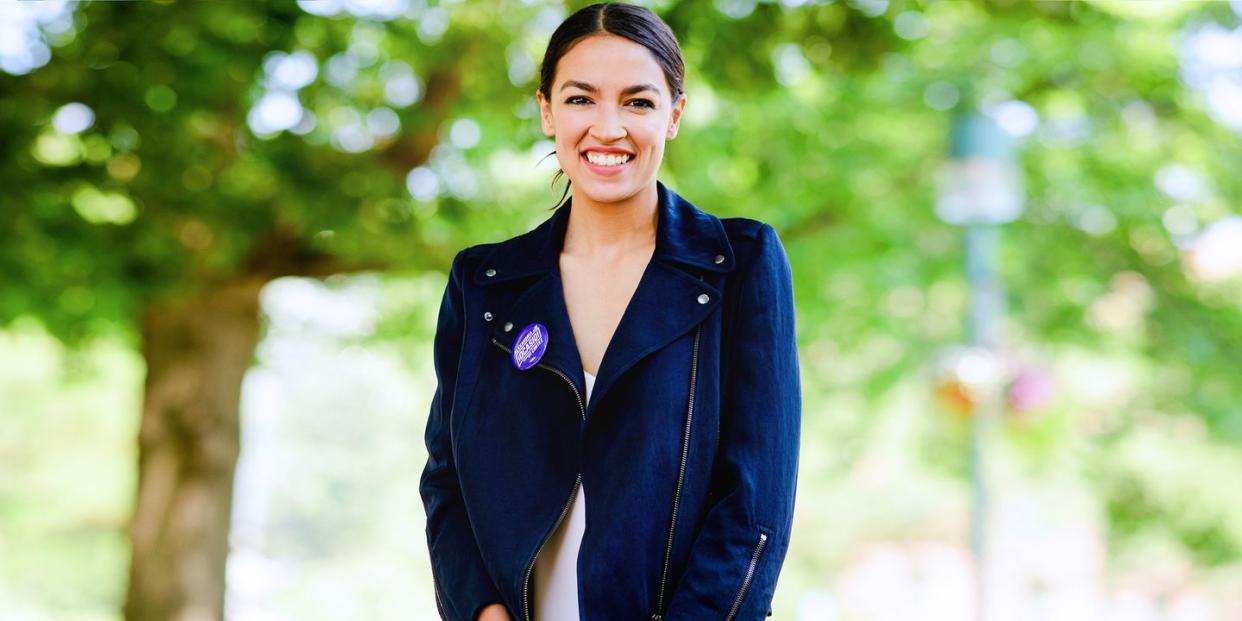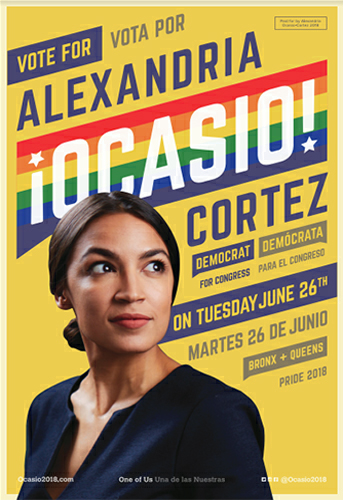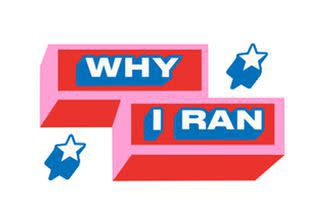Alexandria Ocasio-Cortez Knows She Can't Save America All By Herself

Standing in a small park outside of Ellie’s Diner in the Bronx, Alexandria Ocasio-Cortez could be any other person walking to work. And in some ways, she is. She lives nearby; it’s her local diner we’re standing outside of, taking photos for this article on a sunny Monday in July.
But after winning her district’s Congressional primary election on June 26th-beating out 10-term incumbent Joe Crowley, who also happened to be the fourth-ranking Democrat in the House-it’s clear some things have changed. As we set up to take photos, a young guy, no older than 35, approaches her. “Are you the one I saw on TV?” he asks, steadily getting more and more excited that he’s stumbled into her, this 28-year-old democratic socialist, who will most likely become the youngest woman ever elected to Congress come this November. Ocasio-Cortez confirms it’s her. "Can I get a selfie?"
Being recognized has become a routine part of the strange post-primary life Ocasio-Cortez has been leading for the past three weeks. (That photo request was the second one within the span of our interview.) The video of her first seeing the election results? It went viral. Her first late-show after the primary? Stephen Colbert. Since winning, and therefore almost surely securing her spot in the House thanks to her deep-blue district, her name has hit every major news outlet. Al Jazeera called her the future of US politics.
We sit down together in a red vinyl-padded both, up against a window that overlooks Metropolitan Oval. It’s 11:15 on a Monday morning and already Ellie’s is bustling. Ocasio-Cortez orders scrambled eggs, hash browns, and an iced coffee, switching between English and Spanish as she speaks to the waiter.
"It still is surreal," Ocasio-Cortez tells me. “This is my neighborhood diner. This is my life. And all that other stuff is not really my life. Those three days [after the primary] were the most amount of time I’ve spent in Midtown in months."
Ocasio-Cortez's family has been in the Bronx for 30 years; her mother is Puerto Rican and her father is from the borough. She’s lived there ever since she graduated college in Boston (she went to Boston University), and when she started thinking about potentially running in the midterms, she says she knew the ground was soft. She knew she never saw Crowley around and her neighbors didn’t know him. She knew she could get their support.
Ocasio-Cortez may have looked stunned in that viral video, but she always thought she could win. "Winning was always a possibility," she said. "I never thought of it as an impossible race. I knew it was long odds. There were absolutely days where I didn’t know if I should give up or not, but I always knew it was possible."
And not only was it possible, she ended up winning with 57 percent of the vote. Ocasio-Cortez's platform, which includes tuition-free public colleges and Medicare for all, was so popular that she won a House primary in a district she didn’t even intend to run in, all thanks to write-ins.
So how did she get here? It started with a simple phone call.
"I was nominated at first by a group called Justice Democrats. They were trying to essentially field non-corporate candidates in the 2018 midterm election,” she says. “They were looking for people with a history of community service and my name had come across their desk, and they called.”
It was the right call, at the right time. “I had actually just gotten off of camp at Standing Rock. I was there with the Lakota Sioux and all of the Native peoples that were really standing up to protect the water supply in the Midwestern United States,” she says. “That experience was very personally important and transformative, and I kind of left feeling like I had to do more, and I didn’t know what that was. When I got that call, I just felt like, 'OK, the universe is telling me something, so I’m going to listen.'"
Ocasio-Cortez was working as a waiter in Midtown at the time. And her life didn’t stop just because she’d decided to run for office. "[When I first started the campaign] I usually had to be at work by 10, 10:30 in the morning,” she says. “In the early days, I’d take the subway and then after a couple of months, I started taking the bus to work because [that] allowed me to do stuff above ground like take calls, be on WiFi. Then while I worked, it was a little bit of an organizing hub because a lot of our early supporters would come in, grab tacos. It was Midtown Manhattan so a lot of my regulars, they would be going to work from my district. I started telling people, 'I’m running for Congress.' A lot of my early organizing I just did while I was bartending. The people who designed my campaign posters were regulars at the restaurant. Everyone who sat down, I was recruiting." [Ocasio-Cortez ultimately did quit her waitressing job in the final months of her campaign.]

I ask her about going up against Crowley, who was considered a party boss and was poised to position himself as the next House Speaker. Was she ever worried? Nervous? Scared, even?
Ocasio-Cortez never breaks eye contact. Sure, she concedes, "there were definitely times when it was intimidating because people would say how powerful they were and how [I was] never going to be able to have a job in New York City again, in New York City politics. Queens County really is one of the most fabled political machines. You hear these crazy stories about how all of the sudden someone gets a phone call, and they’re fired. There’s all of this whispered storytelling and how they’re going to drop proposition hits on you and all of these things going on. And toward the end of the race, they tried doing some of that stuff,” she says, without going into detail.
But compound that intimidation with the fear that women everywhere know all too well. “At the beginning I was really concerned and paranoid about my life and my security,” she says. “When you’re a single woman or rather just walking alone at night, you already feel vulnerable as it is. Then imagine walking home alone at night, and you’re challenging one of the most powerful political machines in America. But what I didn’t realize is that their underestimation of me was one of my biggest protections. They really didn’t think I was anything."
"It’s really the best position that you can be in,” she continues, “especially in a competitive environment. Because nobody ever sees you coming. If you’re differently-abled, if you’re a person of color, if you express your identity in a way that’s different from the norm, for whatever reason, there’s an implicit bias where people frankly sometimes take you less seriously. And it’s incredibly frustrating in some environments, but when you’re kind of the captain of your ship, it’s a really good position to be in because it means that people aren’t preparing for you. Especially when you’re playing by a different playbook.”
It’s this “different” playbook that Ocasio-Credits credits with her success. “It’s not just that I’m a woman of color running for office,” she says. “It’s the way that I ran. It’s the way that my identity formed my methods. Because if I was still a woman of color, but I was playing by their playbook, I’m convinced I would’ve gotten squashed. What the people on this campaign accomplished was groundbreaking on so many levels.”
She checks off all the things that were “supposed” to happen to her. “Nobody ever wins the first time they run for office. Nobody’s ever supposed to win their first bid for office. Nobody’s ever supposed to win without taking lobbyists’ money, no one’s ever supposed to defeat an incumbent, no one’s ever supposed to run a grassroots campaign without running any ads on television,” she rattles them off. “We did all of those things."

Of course, it’s not that she never doubted herself. "When I first started, I absolutely had major impostor’s syndrome,” she says. “Especially when I first started, there are a lot of haters out there, and they’re like, 'Who are you? You’re just a waitress running for Congress.' Which was true. Who did I think I was? When so many people are telling you that, it does sink in. Our society so aptly boils people down to the amount of money that they make and their professional position that it demoralizes a lot of really great people.” But she says, “I knew I was more than that. I knew I was an educator. I knew I was an organizer…And I knew what we were doing was right. I was always confident that what I was doing was the right thing to do and that what I was standing for was the morally superior position. And that’s where I started from. But it took me months and months and months to convince myself and to convince others that I was legitimate."
Part of that convincing, that building up of confidence, comes from her femininity she says.
As we sit down to eat, I notice Ocasio-Cortez isn’t wearing her signature swipe of bold red lipstick in Beso by Stila. I know the exact hue and brand already because Ocasio-Cortez fielded so many inquiries about her lipstick following a debate that she divulged it on Twitter.
I have been getting many inquiries about my debate lip color in the last two days.
I GOT YOU.
It’s Stila “Stay All Day” Liquid in Beso. 💄 pic.twitter.com/xhkxSXZXCO- Alexandria Ocasio-Cortez (@Ocasio2018) June 17, 2018
I ask her about the lipstick, and more broadly, how she thinks about self-presentation on the campaign trail. It’s a tricky subject; of course it’s unfair to reduce a woman down to her makeup choices, a trope that is so often pedaled by women’s magazines, but it also feels wrong to ignore the things that so often help women feel powerful.
“I feel like one of the ways in which communities are marginalized is by making us feel like our identities are trivial and that who we are is trivial and that expressing who we are isn’t important.
For me, it’s important to be fashionable,” she says. “That’s part of who I am, and it’s important for me, as a woman, to run while being feminine because I am feminine.”
There’s a stigma against women and fashion, that caring about clothes makes us silly because clothes are frivolous. (That’s a stigma that, of course, extends to magazines like ELLE.) But Ocasio-Cortez is not here for it. She leans in.
“I derive power from my femininity. And any attempt to make femininity trivial or unimportant is an attempt to take away my power. So I’m going to wear the red lipstick. Other people’s attempt to say, 'Oh, talking about lipstick is unimportant,' [they are] talking about feminine expression being unimportant,” she says. “That expressing yourself as a woman is unimportant. Don’t ever believe that. Wear the skirt. Wear the combat boots. Tear up your jeans. Whatever makes you feel authentically yourself and like a badass. The only way that we’re going to move forward is by running as our authentic selves."
That lipstick, by the way, has since sold out: "I used the last of my lipstick on election day, so I’m in the same boat as everyone else!”
And if it hadn’t become clear by now, Ocasio-Cortez is ready for whatever (and whomever) lies ahead. When conservative TV host John Cardillo tried to come for Ocasio-Cortez’s Bronx credentials, she wasted no time in responding.
Hey John,
1. I didn’t go to Brown or the Ivy League. I went to BU. Try Google.
2. It is nice. Growing up, it was a good town for working people. My mom scrubbed toilets so I could live here & I grew up seeing how the zip code one is born in determines much of their opportunity.- Alexandria Ocasio-Cortez (@Ocasio2018) July 1, 2018
"I’m not going to be bullied,” she says. “I grew up being bullied. I grew up as an ugly duckling in high school. I had jacked-up teeth, and I was really small and gangly, and I had a super awkward phase in middle school, and I had things taken from me. I also grew up as a brown girl in a non-brown environment. So I’m used to people trying to define me for me. And I’m over it.
You do need to pick you battles, but that doesn’t mean that you have no battles. And I’m not going to allow someone who knows nothing about me and doesn’t care about me or my community to define who I am. And that’s not partisan. I’m not going to let some clown that’s never stepped in the Bronx tell me about my relationship to the Bronx. Get out of here. And that’s exactly what he was trying to do. Instead of trying to strip me of my femininity, he was trying to strip me of the fact that I’m a third-generation Bronxite. He was trying to cast doubt on who I am, where my family is from. Bruh, if I dropped you in the middle of Hunts Point you’d be crying within 30 minutes. I know that. These people are soft AF. I know they’re soft. It’s bullying. And they rely on people not talking back to them. Bullies rely on no one standing up to them. And for a really long time, no one has stood up to them. No one has stood up for our Muslim brothers and sisters in a really decisive way because they’re scared of what people might say, because they’re scared of getting taken down. I’m not going to let that happen."

It’s this candid, open conversation that proves Ocasio-Cortez has busted down a new door in politics (she confidently told Colbert that Trump doesn’t know “how to deal with a girl from the Bronx”). But she’s no superhero, and she won’t be swooping down to singlehandedly rescue us from our troubles. When I ask her how she feels about being called the future of the Democratic Party, she pushes back.
"I do hope that the future of the party is in big organizing,” she says “I hope that the future of the party is in rejecting lobbyist funds. I do hope that the future of the party is in intersectional and unapologetic arguments for economic, social, and racial justice for working class Americans. Those three things I hope are the future of the Democratic Party. I’m going to work really hard to make that happen, but I know that I don’t have to do it alone.
“I was invited on this TV show and before I went on they were like, 'The defining star of the progressive movement,' and I was like, 'Noooo!' There is no one person. This is the danger, the idea that any one person is going to save us is not true. I’m not going to save us. Only we can save us. And I’m only as useful or powerful as the amount of people knocking on doors and talking to their neighbors."

This interview has been edited and condensed for clarity.
You Might Also Like


